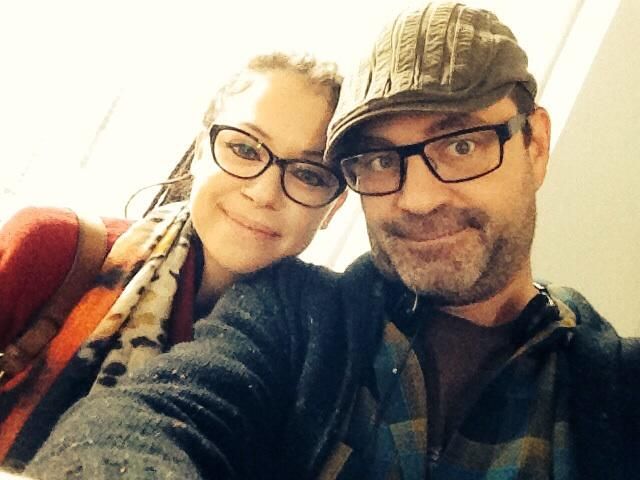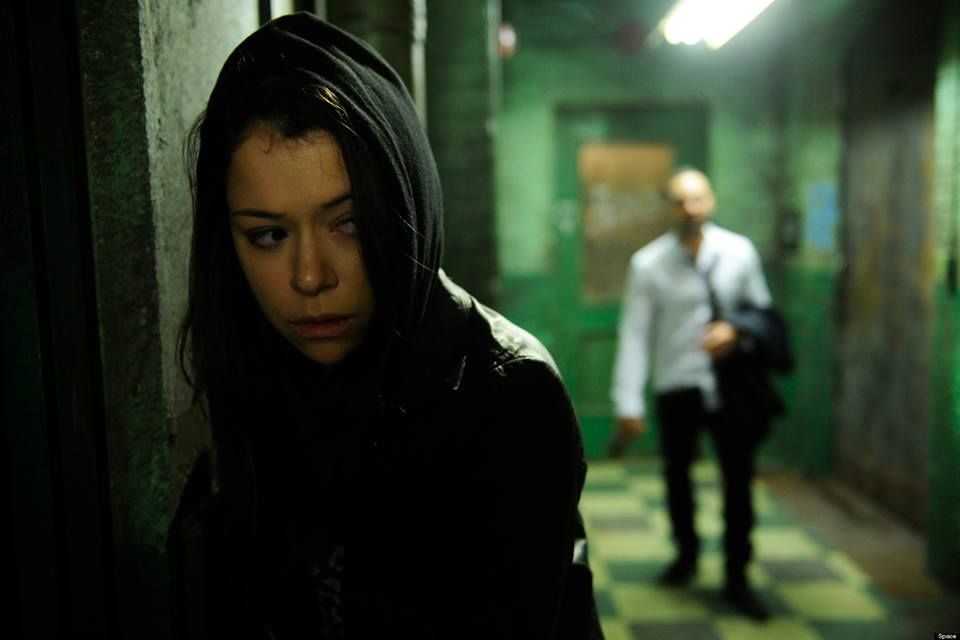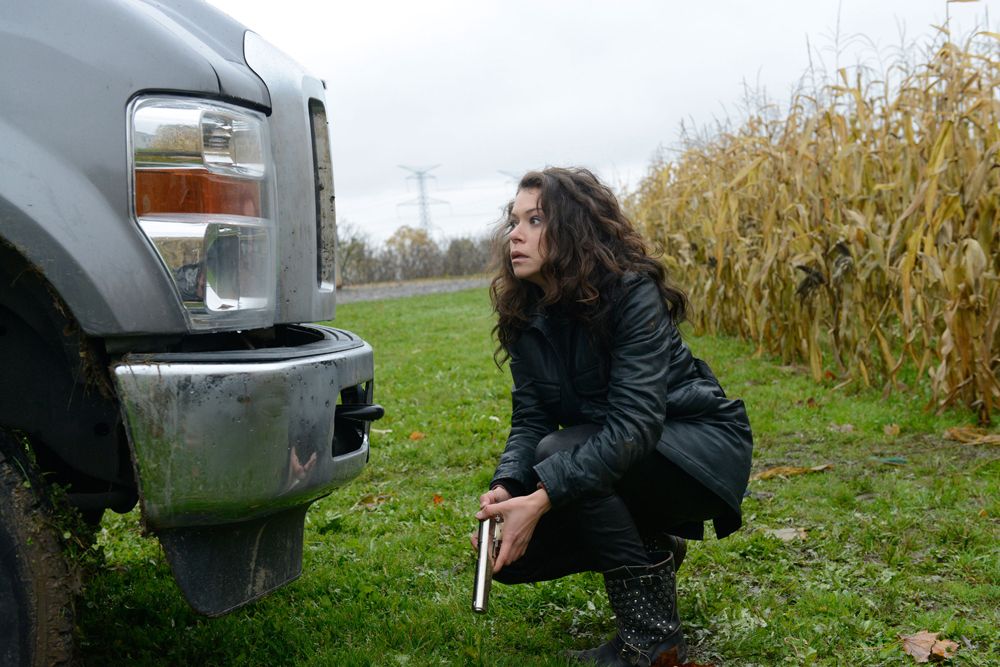When “Orphan Black” returns Saturday, the sci-fi thriller will bring with it a very noticeable uptick in clones, but they won’t all be played by chameleon-like star Tatiana Maslany.
BBC America’s acclaimed series ended its second season with a big reveal that shocked Sarah Manning and her sister clones Cosima, Alison and Helena: Along with Dyad's mysterious female-centric Project Leda that created them, there's also a Project Castor, which focused on a series of similarly bred male clones – one of whom is the renegade Prolethean Mark Rollins.
In anticipation of the Season 3 premiere, “Orphan Black” co-creator Graeme Manson joined the press at WonderCon Anaheim to offer some hints at what storylines lie ahead in the clone saga.
When you got started planning this season, how easily did things come together for you? Did you know already what you wanted to do, where you wanted to go? Or was it a challenge to figure out what the next steps were going to be?
Graeme Manson: Well, we knew some of the big things that we wanted to do. I guess that was probably about it. Usually what we do is, John [Fawcett, series co-creator] and I will go away together for three or four days and just talk through a whole bunch of stuff and figure out what we want to do. And then we go back to the writers and really start working hard on the major tentpoles of the season and working backwards a lot from where we want it to end.
And then within that too, it’s really important that we take each character and we go, "What’s the real character story for each of them?" Because we don’t want to get swallowed up in the plot. And as all this happens, what may seem in the early stages of planning the season, what may get very plot-y and confusing gets stripped back and makes a lot more sense once the characters are driving that stuff.
What went into the decision to continue Cosima's illness? The whole second season she was getting sicker and sicker, and you're keeping it going in Season 3.
There’s a few things: If you take the show as reality and you go, "OK, how much time has actually lapsed?" She’s got an autoimmune disorder, and the various things that you try for doing that is an up-and-down slope. It’s like people get sick, they get sicker, they get a little bit better, they bounce back. So we didn’t feel like we were stretching the story or the reality of the illness to have the illness continue. And also, you don’t see major characters on TV with a serious disease that plays out over a long time. People in TV, they get sick for dramatic reasons and they die, or they recover by the end of the episode. We didn’t want to do that.
You’re introducing the male clones this year. Is he going to play as many characters as Tatiana does, and how are you going to balance how much it’s the females versus the males?
Well, it’s definitely still Sarah’s story. It’s always been Sarah at the heart of this. So as Sarah tries to figure out who the boys are and what they want, it’s really, she is getting closer to their own story as well. So the boy clones have a lot of revelations for us, both about who they are and about who we are.
You have a tremendous cast, but especially a secret weapon in Tatiana --
Not so secret!
Tell me about the challenges that you cooked up for her for this season, and her rising to different occasions that you created for her.
Well, I’ve certainly never been in a situation like this where we can think of anything. We can push her to extremely dramatic, extremely comedic, whatever the elements of each of her clones may be, and we don’t have to really give it a second thought. We know she can get there, and when we begin to share the stories with her, we work quite closely with Tat.
She’s always enthused by the most challenging aspects that we bring to it. That’s the kind of actor she is. She loves those challenges. And certainly when we’re creating new clones – which we don’t do tons of – but to honor them, to honor these characters, she’s very involved in the process of discovering these clones.
What aspect of femininity are you able to explore now that you have the male counterparts that you couldn’t in the previous seasons?
Well, a lot of people are, like, worried: Oh, no, it’s going to become "the guy show," and we’d lose that feminist edge and all the feminist themes. But I don’t think it’s that way at all. I think it’s yin and yang, and there’s no reason why you can’t have men on your feminist show. And if you want to highlight your feminist themes, throw a misogynist into the mix. Then you’ll be able to really hit those themes even harder. With that kind of tension, I do think the themes are stronger this year, if anything. And certainly because we challenge them, we threaten them. We threaten these girls even more then they have in the past. All of those issues of agency and who owns your body, who owns reproduction, all of those things are deeply important to this season.
Is your male clone actor Ari Millen displaying that same versatility that we’ve seen in Tatiana?
Yeah. He is. However, he’s got a different task that Tatiana. In some ways, it’s a more subtler, more difficult task in that the Project Leda, they’re all raised unaware of one another, and they’re purposely placed in these separate social environments to see the effects of nurture rather over nature. Whereas, the boys have been raised in like a military family and a military-type environment. They’ve known their clones. They grew up with their brothers in a sort of little wolf pack. So their differences are more subtle, and they’re a little less concerned about their own individuation.
When we thought about Project Leda, we always thought, "Well, the first thing you would [think] if you met your genetic identical, would be, 'Well, I’m totally different than that person,'" right? You’d look for your differences. Whereas the boys, I think they celebrate their similarities in that sort of wolf pack kind of mentality.
There’s always a big threat in each season, and is this season going to be, who’s fighting each other. Is it going to be the females versus the males?
Yeah. But it’s really, I don’t want to frame it like boys against the girls. Really, it’s far more complicated than that. Who’s pulling their strings, of course, because there’s always another level above us. Plus, Project Leda has its own issues to deal with. We’ve introduced another level at the end of last season, Topside above Dyad. So how they maneuver themselves within Dyad, how they protect themselves and how the sisters come together or are torn apart by these threats, really, that’s the spine of the show. That’s the heart of the show.
As far as the context that we see the clone sisters in, do they kind of get changed up? Do we see them in different environments?
You don’t want to take Alison out of her world too much because it’s just too fun! [So] not exactly. They each get bent a little bit more. I think Cosima, certainly at the beginning of the season, she’s a little bit less involved in science and she gets to relax a little bit. She gets to hang out with Felix, which is fun. So not so much. Not vastly different. Sarah certainly finds herself in situations she’s never been in before. But that always happens to Sarah.
Outside of the clones, one of the best curveballs at the end was Paul being a double agent. Is he going to have a storyline that fans are going to want to get to see?
Yeah, he’s got an awesome storyline this year. He’s got some tricks up his sleeve. Maybe this season we’ll find out who Paul really is.
”Orphan Black” returns for its third season Saturday at 9 p.m. ET/PT on BBC America.





